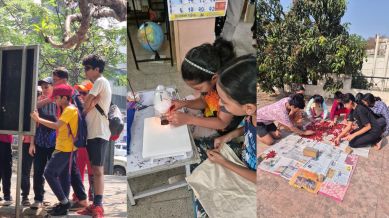Click here to join Express Pune WhatsApp channel and get a curated list of our stories
Against All Odds: Inside a school with no bells, benches or books; just learning through observation
Instead of opening textbooks, Gokul's day starts with something far more exciting: current affairs discussions. The first hour and a half is dedicated to talking about what's happening in the world.

When children arrive at Gokul learning centre in the morning, they don’t rush to find their assigned seats as there are no benches to sit on, no uniforms to straighten, and no morning bell to signal the start of classes. Instead, the day begins with the gentle notes of traditional Indian music floating through the air.
Dr Jyotsna Pethkar, founder of Gokul and a medical practitioner, had a simple dream. “During my schooling, I always felt I could have experienced open classrooms and explored topics beyond textbooks,” she explains. Thirteen years ago, she decided to make that dream a reality.
monthly limit of free stories.
with an Express account.
Today, Gokul operates like no other conventional school. There are no rigid timetables, no heavy textbooks to carry, and no pressure of scoring high marks. Yet, students here learn everything from mathematics, science, economics, to languages and social studies, but in a different way.
“Our focus is on observation-oriented learning,” Pethkar says. “We don’t follow the structured pattern you see in conventional schools with separate lectures for each subject.”
Instead of opening textbooks, Gokul’s day starts with something far more exciting: current affairs discussions. The first hour and a half is dedicated to talking about what’s happening in the world.
When a news story like the Iran-Israel conflict comes up, it doesn’t stay just a news item. The discussion naturally flows into the history of the region, the geography of the countries involved, how it affects India, what people there eat, how their economy works, and much more.
“Students love this way of teaching because it’s interesting,” Pethkar explains. “One topic connects to another, and before they know it, they’ve learned history, geography, economics, and international relations, all from a single news story.”
Indrayani Chavan, who also teaches at Gokul and is an Indology expert, has seen how this approach transforms learning. “All students participate in the discussions, listen carefully, and get their concepts cleared. There’s no need for rote learning, so students learn without stress.”
Unlike most traditional schools, Gokul believes in preparing children for life. The school day runs from 9 am to 2:30 pm with a brief recess. In these hours, children are engaged in various areas such as cooking, first-aid training, communication, astronomy sessions, field visits, debates, painting, sports, and dance, among others, alongside their regular academic tasks.
“We have limited intake, so as to focus on each child,” Chavan explains. “Through periodic evaluation, we get an idea about each student’s interests and likes. This makes it easier for parents to decide about their child’s future.”
The school admits students between ages 6 and 14. After completing their time at Gokul, students enroll with the National Institute of Open Schooling (NIOS) for their tenth standard board exams and then continue to colleges of their choice.
Moreover, one of the advantages noticed is the reduced stress on their children. “I used to be in conventional school till fourth grade, where I was forced to learn Science, Math and other subjects while I loved painting. After admission to Gokul, I used to be guided by domain experts and invested the majority of my daily time in painting, which landed me in the National Institute of Fashion Technology in Bengaluru,” says Vedika Gadgil, first-year student at NIFT.
“There was no pressure for higher percentages. Children get adequate rest and can spend time honing essential skills in art, sports, and other areas. Even they excel after getting into the competitive entrance exams as learning has been concept-based, focused on understanding through field visits, and practical experience in addition to theoretical touch,” Vedika adds.
Over 13 years, six batches of students have passed from Gokul, and the results have been encouraging. “Students develop better clarity in thoughts and decision-making, which makes it easier for them to choose their careers,” Chavan says.
Speaking to The Indian Express, Shraddha Mokashi, a school psychologist, says, “As a parent, I have noticed my daughter is more confident, asks better questions, and has a genuine curiosity about the world around them. She loves cricket, and since she’s not required to attend coaching classes she can train for at least 4 hours daily in the sport.’
Click here to join Express Pune WhatsApp channel and get a curated list of our stories